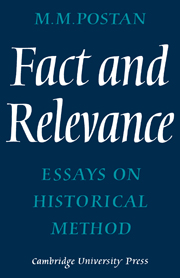Book contents
- Frontmatter
- Contents
- Acknowledgments
- Preface
- 1 Reason in social study
- 2 History and the social sciences
- 3 The historical method in social science
- 4 Function and dialectic in economic history
- 5 Fact and relevance in historical study
- 6 Economic and social history
- 7 Economic growth
- 8 A plague of economists?
- 9 The uses and abuses of economics
- 10 Agriculture and economic development: a lesson of history
- 11 Technological progress in post-war Europe
- 12 A study of history
- 13 Karl Marx: a democrat?
- 14 Hugh Gaitskell: political and intellectual progress
- Index
2 - History and the social sciences
Published online by Cambridge University Press: 07 October 2011
- Frontmatter
- Contents
- Acknowledgments
- Preface
- 1 Reason in social study
- 2 History and the social sciences
- 3 The historical method in social science
- 4 Function and dialectic in economic history
- 5 Fact and relevance in historical study
- 6 Economic and social history
- 7 Economic growth
- 8 A plague of economists?
- 9 The uses and abuses of economics
- 10 Agriculture and economic development: a lesson of history
- 11 Technological progress in post-war Europe
- 12 A study of history
- 13 Karl Marx: a democrat?
- 14 Hugh Gaitskell: political and intellectual progress
- Index
Summary
The place of history in the social sciences appears much more doubtful to the historians than to the social scientists. The latter recognize, and indeed strive for, generalizations impartially derived from history as well as from anthropology and statistical sociology. They may still disagree as to whether the theoretical manipulation of social data should be in the hands of those who collect them, i.e. the historian, the anthropologist and the statistician, or whether a special body of sociologists is necessary to co-ordinate and generalize from facts which other social sciences gather. But there is no disagreement about the need and the possibility of employing social evidence, including historical evidence, for theoretical purposes.
Some fifty to seventy-five years ago this point of view would not have appeared as exceptionally controversial even to the historian. In the heroic age of historical writing, when the main outlines of European historiography were for the first time drawn, history was studied chiefly for the sake of the lessons it taught, or, in other words, for the sake of the generalizations it suggested. It was only in the nineteenth century that a reaction developed against universal historical laws. In the beginning the reaction was a half-hearted one. Men like de Maistre or Savigny were even more anxious to learn from history than Voltaire or Montesquieu had been. Where they differed from the eighteenth-century rationalists was in their insistence on the peculiarity of historical generalizations, their local and temporal relativity.
- Type
- Chapter
- Information
- Fact and RelevanceEssays on Historical Method, pp. 15 - 21Publisher: Cambridge University PressPrint publication year: 1971
- 2
- Cited by



